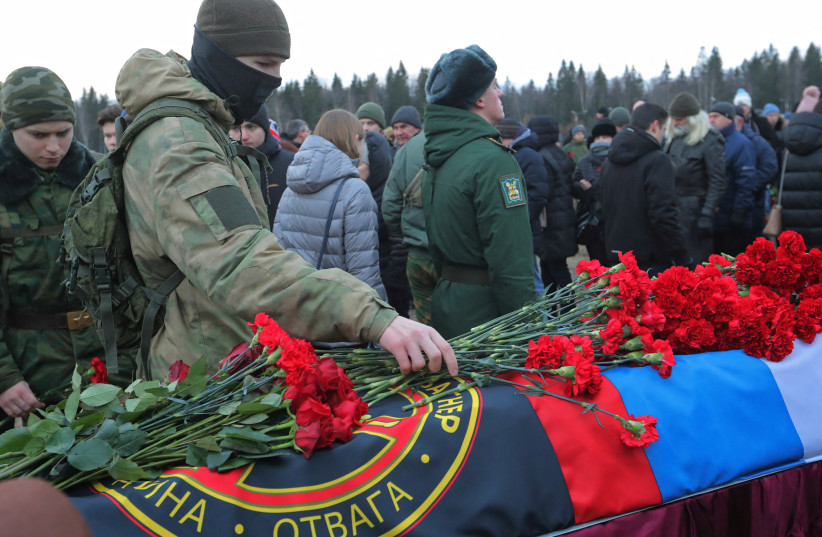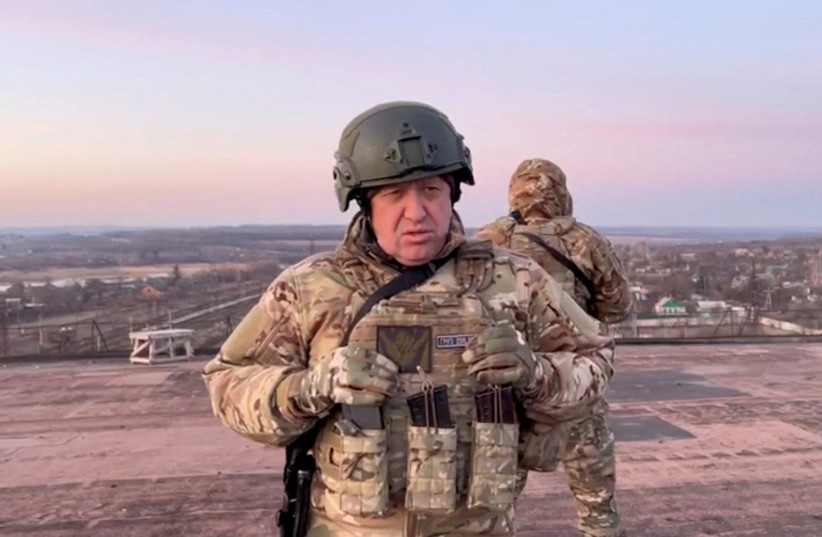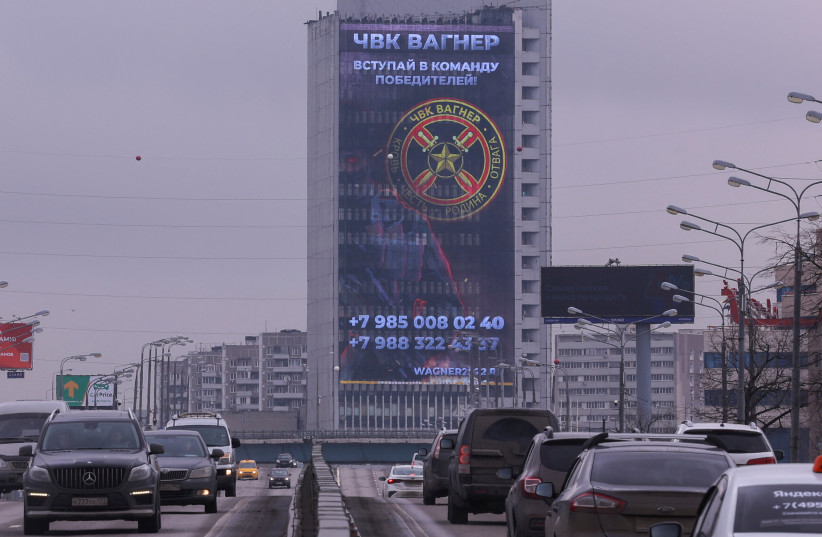Wagner founder Yevgeny Prigozhin launched a verbal attack against other Russian private military companies deployed by the Kremlin in Ukraine on Saturday, highlighting the proliferation of Russian mercenary groups, especially those affiliated with oligarchs and political leaders.
Ukrainian government body National Resistance Center described these groups on February 13 as "neo-feudal" -- private armies outside official Russian structures, rivaling the official military, and loyal more to their patrons rather than Russian President Vladimir Putin.
These PMCs have "not only heavy equipment and artillery, but even aviation," noted the National Resistance Center.
Mercenaries and PMCs are not new phenomena, but the alignment of military and political might in these private companies makes their leaders more akin to warlords than guns for hire.
As more private military groups founded by oligarchs, companies, and politicians compete with the Defense Ministry, Russian “warlords” may be a more common player in the Russian political field.

PMCs have become useful to Russia during the ongoing campaign against Ukraine. The National Resistance Center said in early March that PMCs allow Putin to avoid carrying out general mobilizations. In September Putin announced a "partial mobilization," which was poorly received by the populace, and the Russian leader has promised not to conduct additional call-ups.
The UK Defense Ministry said on April 4 that Putin likely believes mercenary losses are better tolerated to citizens than regular military deaths. The Kremlin also likely regards PMCs as insulated from the inefficiencies of the Russian military, and that its troops are "less constrained by the limited pay levels," the UK ministry said.
Wagner has become an internationally infamous actor in the Russia-Ukraine War, playing an instrumental role since the February 24 invasion. Its success also serves as a template for others aspiring for power.
Is the Wagner founder on a downward spiral?
Prigozhin, as an oligarch, is a financial force in various industries such as catering and restaurant businesses. He's often described as being close to Putin, affording him some political power, and of course, through his mercenary group, he has his own military.
In multiple engagements, most recently in Bakhmut, Wagner has been credited by Western intelligence as responsible for Russian victories. Wagner's successes are part of what has created strife between the group and the Russian Defense Ministry.
Prigozhin has publicly attacked Defense Minister Sergei Shoigu for what he has described as his incompetent command of the Ukraine campaign and has accused the minister of taking credit for Wagner's achievements -- at times allegedly ordering the mercenaries to withdraw so that the military can seize towns already weakened by Wagner assaults.

The oligarch has accused the Defense Ministry of sabotaging his men by withholding ammunition. While Wagner was once able to recoup manpower losses through the recruitment of convicts in exchange for pardons, the UK and Ukrainian Defense Ministries have assessed that the mercenary group has had this privilege revoked.
Prigozhin has lost much of his social capital in the Kremlin and has claimed that Russian top brass has sought to destroy Wagner. The Institute for the Study of War (ISW) assessed that in recent weeks that Prigozhin has regained some standing by improving ties with the Russian brass, but the oligarch denied such reports.
The UK Defense Ministry assessed on April 4 that Russia was seeking to sponsor and develop other PMCs to replace Wagner as the invasion vanguard.
"Russia’s military leadership likely wants a replacement PMC that it has more control over," said the UK Defense Ministry.
There is no lack of options for Russian PMCs operating in Ukraine, though they are far from the military strength of Wagner. One, PMC Redut, is a longstanding PMC said to be owned by oligarch Gennady Timchenko, according to The Guardian.
Others have been created more recently, in response to Wagner's success. Shoigu is said to have created his own PMC, Patriot, to compete with Wagner, according to Ukrainian media and government.
PMC Potok and PMC Alexander Nevsky are financed by Gazprom, the state-owned gas company, Prigozhin claimed on Saturday. The Ukrainian National Resistance Center had said that Gazprom was creating its own force in mid-February. Prigozhin claimed Saturday that Potok is subservient to Redut, which in turn is affiliated with the Russian Defense Ministry.
In an ever-tangled web of allegiances, a former Wagner leader created PMC Convoy in November, Meduza reported in late March. Convoy is operating out of Crimea.

The National Resistance Center accused Russian Businessman Konstantin Malofeev of creating his own Wagner-like unit, a "Union of Donbas Volunteers."
Competitors loom on Wagner's horizon
In February, Reuters reported that Chechen leader Ramzan Kadyrov said he also planned to create his own Wagner-like unit. Kadyrov is an ally of Putin, but has also criticized Shoigu and worked alongside Prigozhin.
"When my service to the state is completed, I seriously plan to compete with our dear brother Yevgeny Prigozhin and create a private military company. I think it will all work out," said Kadyrov.
Kadyrov's Chechen Republic fighters were also instrumental forces in the beginning of the war, though Kadyrov has since lost his political prominence. The National Resistance Center claimed in early March that Kadyrov had begun to recruit fighters from the Donetsk separatists forces.
Prigozhin has cast the smaller mercenary groups as micro-PMCS, and has asserted that they have been failing to hold their positions and lack proper equipment. The ISW noted on Monday that Prigozhin "criticized the general proliferation of such PMCs, which likely suggests that Prigozhin views these new entities as Wagner’s competition."
The Ukrainian National Resistance Center has accused Prigozhin of having political ambitions, including control of the Defense Ministry. In what is likely an exaggeration, the government body described Prigozhin as positioning himself in a "feudal war for Putin's inheritance."
The Center said in February that the creation of these groups represents an erosion of the state's monopoly on violence -- Indeed, in situations in which the state is not the only entity with the legitimate use of force, it often finds itself in direct armed conflict with rival groups loyal to prominent individuals. This can be seen recently between Sudanese warlords who have control of different state militias.
The Russian military is only in political strife with PMCs, and it is speculative and perhaps too far, as the National Resistance Center predicts, that there will be a civil war between these Russian warlords. However, it can not be denied that PMCs backed by companies, oligarchs and individual politicians are becoming major players in Russia's foreign affairs. It is possible that their roles will grow domestically as well.
